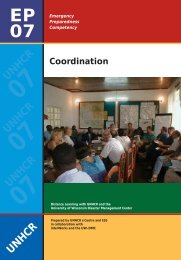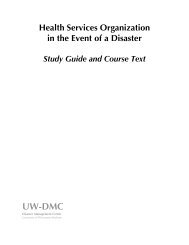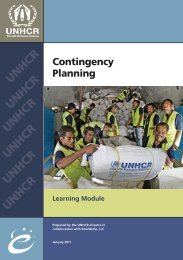Managing External Relations - Disaster Management Center ...
Managing External Relations - Disaster Management Center ...
Managing External Relations - Disaster Management Center ...
Create successful ePaper yourself
Turn your PDF publications into a flip-book with our unique Google optimized e-Paper software.
EP<br />
04<br />
■<br />
56<br />
<strong>Managing</strong> <strong>External</strong> <strong>Relations</strong><br />
Activities and Methods to Build Media <strong>Relations</strong> Capacity<br />
Closely monitoring newspapers and other media.<br />
Proactively working to provide international and national media with<br />
information/media skills.<br />
Seeking assistance and support from PI professionals.<br />
Providing logistical support to media staff when possible.<br />
Media <strong>Relations</strong>hips<br />
UNHCR staff must develop relationships with different types of media organisations. These range<br />
from national to international media services and may include newspaper, TV or documentary<br />
journalists. Developing a working relationship with the national information service in a country is<br />
also a critical component of media relations.<br />
National Media Representatives<br />
As a general rule, locally based media will be very responsive to news affecting their countries and<br />
fellow citizens and will welcome information materials. One of your first priorities should be to<br />
cultivate relationships with local newspapers, magazines, television and radio networks. Use of local<br />
languages by these media helps disseminate information to those who do not speak or read major<br />
international languages. Both local and foreign representatives of the diplomatic community will<br />
closely monitor the local language media, as it may reflect more closely what the local people read/<br />
watch/and listen to than do international news media.<br />
Local and national media can have a profound effect on local opinions, which can in turn affect<br />
opinions about UNHCR’s operations. National media may help determine local attitudes toward the<br />
refugees and may provide an early indication of sensitive issues and government policies. The<br />
national government will likely be concerned about both local and international coverage.<br />
Members of the International Media<br />
Most of the global major media outlets have foreign correspondents based in capital cities or rely on<br />
local or freelance journalists. In general, TV, radio and newspapers operate on tight deadlines and<br />
need factual stories on the emergency, with some background information. Magazines and magazine<br />
programs cover stories in depth and have more time available to do research and re-check their<br />
stories. Wire services such as AFP, AP, InterPress Services, UPI and Reuters produce bulletin-type news<br />
stories and have very short deadlines. Wire services are likely to be the major sources for worldwide<br />
coverage of an emergency.<br />
Government Information Services<br />
<strong>Relations</strong>hips should be established as soon as possible in an emergency with the official press office<br />
or national information service. Any general statement or press release should be shared with these<br />
offices and the government department responsible for refugees. Statements related to joint<br />
government-UNHCR actions might need to be cleared with the government first.








